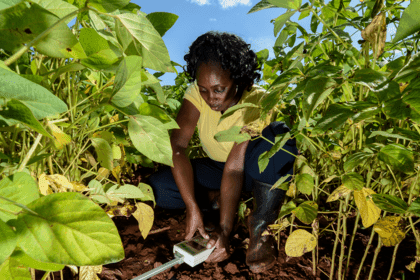
Julia Gillard's speech on climate and health at COP28
Julia Gillard, chair of Wellcome and former Prime Minister of Australia, explains why 'phasing out fossil fuels is a public health intervention' on the eve of the first ever Health Day at COP28 in Dubai.
Julia Gillard gave her keynote speech on Saturday 2 December, ahead of the first Health Day at COP which took place on 3 December.
She explained why growing evidence shows that phasing out fossil fuels will 'protect and promote people's health on a truly global scale.'
Ms Gillard outlined Wellcome's plans to spend £100m this year on research to understand the effects of climate change on health, and how to protect people.
This includes research to understand the biology of extreme heat’s effects and to develop early-warning systems for infectious diseases.
Full text of the speech
I am delighted to be here on the eve of the first ever Health Day at COP, and I’ve been inspired by what I’ve heard during this Leaders Event. Tomorrow’s COP28 Declaration on Climate and Health will be an historic first step to putting health at the heart of climate action.
Coming to COP should feel like together we are saving lives and protecting people’s health. Yet hopes for action to prevent and adapt to climate change often seem to evaporate, and the global temperature continues to rise.
What makes it so difficult to do what we know is essential?
For leaders and communities, I suspect the answer to that question is three-fold. There are always competing crises vying for attention. The struggles of life today - making ends meet, coping in a rapidly changing world – mean it is harder to focus on the future. In addition, there is uncertainty about precisely what path to choose.
That is all understandable, but we need to bust through these barriers. Leadership at every level – global, national, community – isn’t about just getting by or settling for what’s possible.
Leadership is about making possible what needs to happen.
The human costs of climate change are measured in people’s lives and quality of life. It’s also measured in the economic cost of a population with more health issues. Lower employment, lost productivity, the increased costs of health and social care.
Turn it around, and these all become savings over the longer term, and they need to be set against the short-term costs.
A simple example. Research in the British Medical Journal last week showed that transitioning away from fossil fuels towards renewable energy, will not only reduce the degree of climate change we face, it will also save – through the reduction of air pollution alone – at least 5 million lives a year, every year.
Phasing out fossil fuels is a public health intervention. Growing evidence shows it will protect and promote people’s health on a truly global scale.
But the world will still get hotter.
Adaptations will be needed - from climate-resilient crops, to tools that predict where diseases like cholera are most likely to break out.
Wellcome is a global charitable foundation, transform health through research. We will spend £100 million this year on research to understand the effects of climate change on health, and how to protect people.
Research to understand the biology of extreme heat’s effects; to develop early-warning systems for infectious diseases; to assess the health benefits of policies to reduce greenhouse gas emissions because every possible response to climate change, at global, national and local level, has a health dimension.
And we believe that taking health into account will tip the balance to making possible the actions that will best prevent further climate change, as well as enabling us to better adapt to what is already occurring. This will protect and enhance our physical and mental health, which in turn bolsters productivity and economic growth.
That’s why we must all put health and research at the heart of the global response to climate change.
